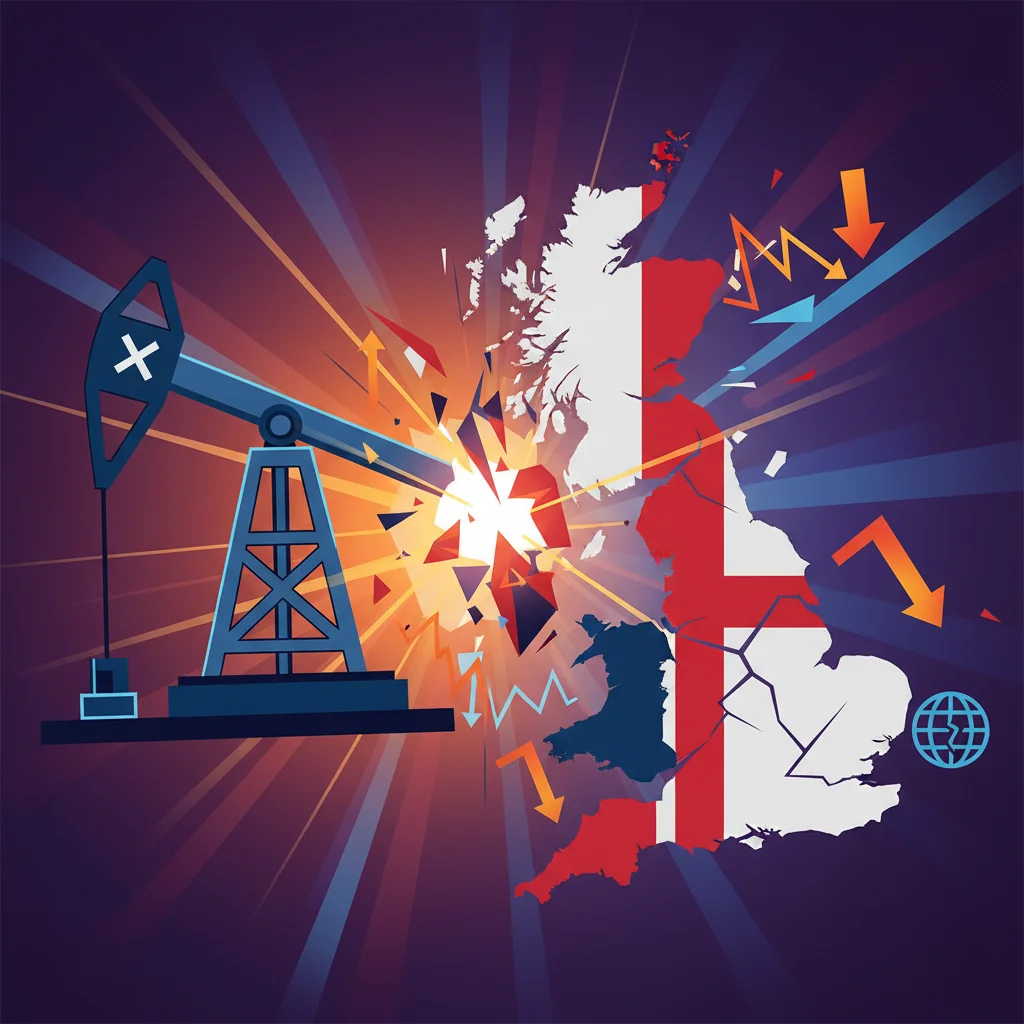
Collision Course: Why the Exxon vs. UK Government Standoff is a Red Flag for Investors and the Economy
In the high-stakes world of international business and national politics, communication is paramount. When it breaks down, the tremors are felt far beyond the boardroom, shaking the foundations of local economies and sending ripples through the global stock market. A dramatic standoff is currently unfolding in Scotland, where UK government ministers have accused American oil and gas behemoth ExxonMobil of a “lack of engagement” and cancelling crucial meetings regarding the future of a vital petrochemical plant. This isn’t just a corporate dispute; it’s a litmus test for post-Brexit industrial policy, a case study in corporate responsibility, and a critical data point for anyone involved in finance and investing.
The conflict centers on the Mossmorran ethylene plant in Fife, a cornerstone of Scotland’s industrial landscape. According to correspondence seen by the Financial Times, UK and Scottish ministers have voiced “deep concern” over Exxon’s perceived reluctance to engage in constructive dialogue aimed at averting the closure of the facility’s ethylene unit (source). This public accusation of being “ghosted” by a multinational corporation puts the UK government in a precarious position and raises serious questions for investors about Exxon’s strategy and the stability of the UK’s industrial sector.
The Strategic Importance of the Mossmorran Plant
To understand the gravity of the situation, it’s essential to grasp the role of the Fife Ethylene Plant (FEP). Opened in 1985, Mossmorran is one of the UK’s most significant industrial sites. It processes ethane from the North Sea to produce ethylene, a fundamental building block for a vast range of products, from plastics and solvents to antifreeze and textiles.
The plant’s contribution to the economy is substantial. It directly employs hundreds of skilled workers and supports thousands more through its extensive supply chain. Its output is critical not just for the UK but for the European chemical industry, making it a strategic asset for national and international commerce. The potential closure of its ethylene unit would create a significant vacuum, disrupting supply chains and having a chilling effect on the regional economy. This is precisely why the government is so invested in securing its future, seeing it as a key piece in the complex puzzle of the national economy.
A Tale of Two Agendas: Government vs. Corporation
The core of the conflict, as detailed in government correspondence, is a perceived communication vacuum. Ministers from both Westminster and Holyrood have expressed frustration, stating that Exxon has “not engaged constructively” and has cancelled planned meetings at the last minute. This behaviour suggests a strategic disconnect between the government’s desire for a collaborative solution and Exxon’s corporate priorities.
From the government’s perspective, the goal is twofold: preserve jobs and maintain a critical piece of industrial infrastructure. They have signaled a willingness to discuss support packages and long-term investment to ensure the plant’s viability. Their public airing of grievances is a clear tactic to apply political and public pressure on the company, a move that could impact its standing on the stock market and among institutional investors who prioritize stable government relations.
Exxon’s motivations are less transparent but can be inferred from broader industry trends. The global petrochemical market is fiercely competitive, and older plants like Mossmorran face significant challenges from newer, more efficient facilities in the Middle East and the US. Furthermore, with mounting pressure to decarbonize, the long-term economics of fossil fuel-dependent industries are under intense scrutiny. It is plausible that Exxon is conducting a cold, hard financial analysis where the costs of upgrading the plant and managing its environmental footprint outweigh the potential returns. Their silence could be a negotiation tactic, or it could be a sign that they have already made a decision internally.
India's IPO Boom: From Valuation Frenzy to a New Era of Financial Maturity
Stakeholder Analysis: A Complex Web of Interests
The situation involves multiple stakeholders, each with distinct priorities and vulnerabilities. Understanding these perspectives is crucial for a complete analysis of the financial and economic implications.
| Stakeholder | Primary Interest / Goal | Potential Impact of Closure |
|---|---|---|
| ExxonMobil | Maximizing shareholder value, optimizing global asset portfolio, managing ESG risks. | Financial gain from divestment, but significant reputational damage and potential regulatory backlash. |
| UK & Scottish Governments | Protecting jobs, ensuring economic stability, maintaining industrial capacity. | Major political failure, regional economic decline, and questions about the UK’s attractiveness for investment. |
| Employees & Unions | Job security, fair wages, and safe working conditions. | Devastating loss of hundreds of high-skilled, well-paid jobs, with a severe knock-on effect on the local community. |
| Investors | Financial returns, long-term growth, and management of ESG risks. | Uncertainty over Exxon’s UK strategy, potential for stock price volatility due to negative press and political risk. |
| Local Community & Supply Chain | Economic prosperity, environmental safety, and continued business for local suppliers. | Significant economic downturn for the Fife region, loss of business for hundreds of SMEs in the supply chain. |
The Broader Implications for Finance and Investing
This localized dispute in Scotland has far-reaching consequences for the world of finance, economics, and trading. For investors, it highlights the growing importance of political and social risk analysis.
- ESG Investing Under the Microscope: This case is a perfect example of the complexities of ESG investing. While closing an ethylene plant might reduce a company’s carbon emissions (the ‘E’), it can have a disastrous social impact (the ‘S’) and demonstrates questionable corporate governance (the ‘G’). Investors are increasingly sophisticated, using advanced financial technology to look beyond simple metrics and assess how a company manages its relationships with all stakeholders. A company that alienates a G7 government is a red flag.
- Sovereign Risk and Industrial Policy: For those investing in the UK, this standoff raises questions about the government’s ability to influence multinational corporations and protect key industries. A failure to secure the future of Mossmorran could be perceived as a weakness in the UK’s post-Brexit industrial strategy, potentially deterring future foreign investment in critical sectors of the economy.
- Stock Market Volatility: While this single plant is a small part of Exxon’s global empire, headline-grabbing conflicts create uncertainty. Activist investors and those using algorithmic trading strategies can seize on such news, leading to short-term volatility in the company’s stock price. The reputational damage can have a longer, more corrosive effect on shareholder value.
Solving the Market: What the FT Crossword Teaches Us About Modern Finance
The Role of Modern Financial Technology
In today’s hyper-connected financial landscape, disputes like this are no longer confined to closed-door meetings and niche trade publications. The rise of financial technology, or fintech, has democratized information and empowered a new generation of investors and analysts.
Fintech platforms now routinely integrate ESG scoring and news sentiment analysis directly into their interfaces. An investor considering Exxon can instantly see flags for “labor disputes” or “government conflicts,” influencing their trading decisions. The digital paper trail of corporate actions, or in this case, inactions, is permanent and easily accessible. In the future, one could even imagine supply chain transparency initiatives, potentially leveraging technologies like blockchain, that would provide end-to-end visibility, showing global consumers exactly which products rely on the ethylene from a plant like Mossmorran. This level of transparency changes the calculus of corporate decision-making, as the court of public and investor opinion is always in session.
The Kidult Economy: How Lego and Pokémon are Powering a Surprising Market Rebound
An Uncertain Future
The standoff over the Mossmorran plant is a high-stakes game of chicken with no easy resolution. The UK and Scottish governments have drawn a line in the sand, demanding engagement and partnership. ExxonMobil, a titan of the global energy market, appears to be weighing its options, with its silence speaking volumes.
For business leaders, investors, and finance professionals, this is a crucial story to watch. It is a powerful reminder that in the modern economy, financial performance cannot be divorced from social responsibility and political reality. The outcome will not only determine the future for hundreds of workers in Fife but will also serve as a barometer for corporate-government relations and the future of heavy industry in the Western world. Whether this collision course leads to a catastrophic crash or a last-minute swerve towards compromise remains to be seen, but the shockwaves will be felt across the economy for years to come.


